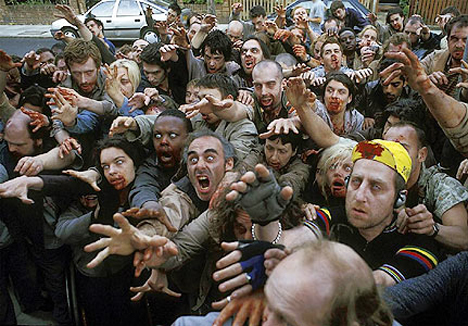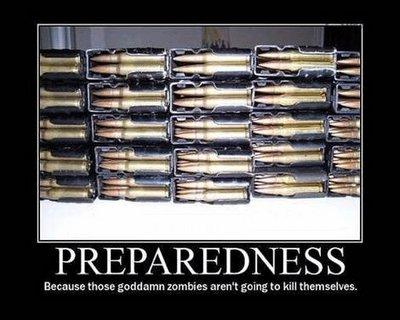Tag Archives: zombie
Doomsday 2012: If Not Zombies then….UFO’s, Planet X and Other Heavenly Bodies
 Doomsday 2012: If Not Zombies then….UFO’s, Planet X and Other Heavenly Bodies
Doomsday 2012: If Not Zombies then….UFO’s, Planet X and Other Heavenly Bodies
By Jim Donahue
After careful reflection and some prompting from certain individuals, I feel as though I have forgotten to mention some material in regards to what might happen on 12/21/2012. So for the moment, the next installment, Doomsday 2012: How to Prepare and Survive the Event, is on hold while I touch on some other perspective problems.
UFOs have been a hot topic of debate all over the world for eons. What with more than one airline pilot admitting to have seen a UFO, it would appear that they do in fact exist. In fact, in México City, UFO sightings are a daily happen stance. And there are other places around the globe where similar things occur.
The History Channel has a series Ancient Aliens attempts to deal with this phenomenon from a factual standpoint. It comes off as factual to some degree, but in the end, it’s just entertainment. One of the show’s most well-known contributors, Erich von Däniken, author of the book, Chariots of the Gods? Is accepted as gospel by true believers.
The background information for the series, posted on the channel’s website, says, “According to ancient alien theorists, extraterrestrials with superior knowledge of science and engineering landed on Earth thousands of years ago, sharing their expertise with early civilizations and forever changing the course of human history. Ancient alien theory grew out of the centuries-old idea that life exists on other planets. The space program played no small part in this as well: If mankind could travel to other planets, why couldn’t extraterrestrials visit Earth?
Most ancient alien theorists, including von Däniken, point to two types of evidence to support their ideas. The first is ancient religious texts in which humans witness and interact with gods or other heavenly beings who descend from the sky—sometimes in vehicles resembling spaceships—and possess spectacular powers. The second is physical specimens such as artwork depicting alien-like figures and ancient architectural marvels like Stonehenge and the pyramids of Egypt.
Alex Knapp of Forbes.com says, “I find it incredible and frightening that a worldwide distributed television channel that bills itself as ‘The History Channel’ can broadcast such rubbish as Ancient Aliens. If it were an entertainment program, I’d have fewer worries (although it would still make me cross); it is the implied authority of the channel (‘The History Channel,’ not just any old ‘History Channel’) that makes the broadcast of this series so potentially damaging as we saw in the reaction of the forum poster quoted above. A channel that is making claims for its authoritative status, which offers educational resources, has a responsibility not to mislead its viewers (no doubt its executives think of them as ‘customers’). That responsibility is one that all makers and broadcasters of supposedly factual television have, but one that few of them take seriously: the responsibility to check facts.”
Okay, now let’s talk about Planet X. Planet X, also known as Nibiru, is a mysterious object that orbits our sun every 3600 years. This object has a very significant connection to the Mayan calendar date of 2012. There is so much information about what is happening in our solar system that even the local news channels report that there are signs of planet X. Dr. Michio Kaku a renowned scientist claims that scientists like him had made a mistake. He made a statement saying that scientific data regarding the passing of Planet X passing through our solar system was off by a factor of 20. What this means is that scientists had previously misinterpreted the difference between a X class solar storm and the new catastrophic Y class solar storms detected in 2003 from hitting the Earth. This corrected data makes an immensely distinct difference between a survivable X class solar storm versus an incredibly strong Y class solar storm that would disrupt the world so harshly with the possible result of setting humanity back towards a third world economy across a global scale. This is a very real difference in data and a very real threat to mankind. And so it goes. We may have a near Earth object collide with our planet.
There is also increased interest in Earth’s moon. Some say it’s a landing base and operations center for aliens. Rumor has it that the American government has marked as classified a lot of information about findings on the Moon. In 1988, a prominent Chinese official, a member of the nation’s space program, unveiled pictures of human footprints on the lunar surface. The official stated that he had received the information from a reliable source and accused the Americans of concealing that information. The photos were dated from August 3, 1969 – two weeks after Armstrong and Aldrin stepped onto the surface of the Moon on July 20, 1969. Therefore, the materials of the lunar mission were studied and classified by NASA.
On March 15, 2009, The New York Times produced another sensation. The same Chinese official, Mao Kan, stated that he had obtained over than 1,000 secret NASA photographs depicting not only human footprints but also a human carcass on the surface of the Moon. Some of the bones in the carcass were missing, the official said. The human corpse must have been dropped on the Moon from an alien spaceship, but the extraterrestrials kept some tissue samples for research.
The photos were taken by a lunar probe. The absence of air makes it possible to capture minute details from the lunar orbit. The pictures of the carcass were very clear.
Dr. Ken Johnston, former manager of the Data and Photo Control Department at NASA’s Lunar Receiving Laboratory, said that US astronauts had found and photographed ancient ruins of artificial origin on the Moon. Supposedly, US astronauts had seen large unknown mechanisms on the Moon. This data was classified by the US government.
Some folks are true believers, and others are skeptical. Which are you?
ZOMBIE PREPPERS – Using zombies to teach science and medicine
 With my colleague Greg Tinkler, I spent an afternoon last week at a local public library talking to kids about zombies:
With my colleague Greg Tinkler, I spent an afternoon last week at a local public library talking to kids about zombies:
The Zombie Apocalypse is coming. Will you be ready? University of Iowa epidemiologist Dr. Tara Smith will talk about how a zombie virus might spread and how you can prepare. Get a list of emergency supplies to go home and build your own zombie kit, just in case. Find out what to do when the zombies come from neuroscientist Dr. Greg Tinkler. As a last resort, if you can’t beat them, join them. Disguise yourself as a zombie and chow down on brrraaaaiiins, then go home and freak out your parents.
Why zombies? Obviously they’re a hot topic right now, particularly with the ascendance of The Walking Dead. They’re all over ComicCon. There are many different versions so the “rules” regarding zombies are flexible, and they can be used to teach all different kinds of scientific concepts–and more importantly, to teach kids how to *think* about translating some of this knowledge into practice (avoiding a zombie pandemic, surviving one, etc.) We ended up with about 30 people there: about 25 kids (using the term loosely, they ranged in age from maybe age 10 to 18 or so) and a smattering of adults. I covered the basics of disease transmission, then discussed how it applied to a potential “zombie germ,” while Greg explained how understanding the neurobiology of zombies can aid in fleeing from or killing them. The kids were involved, asked great questions, and even taught both of us a thing or two (and gave us additional zombie book recommendations!)
For infectious diseases, there are all kinds of literature-backed scenarios that can get kids discussing germs and epidemiology. People can die and reanimate as zombies, or they can just turn into infected “rage monsters” who try to eat you without actually dying first. They can have an extensive incubation period, or they can zombify almost immediately. Each situation calls for different types of responses–while the “living” zombies may be able to be killed in a number of different ways, for example, reanimated zombies typically can only be stopped by destroying the brains. Discussing these situations allows the kids to use critical thinking skills, to plan attacks and think through choice of weapons, escape routes and vehicles, and consider what they might need in a survival kit.
Likewise, zombie microbes can be spread through biting, through blood, through the air, by fomites or water, even by mosquitoes in some books. Agents can be viral, bacterial, fungal, prions or parasitic insect larvae (or combinations of those). Mulling on these different types of transmission issues and asking simple questions:
“How would you protect yourself if infection was spread through the air versus only spread by biting?”
“How well would isolation of infected people work if the incubation period is very long versus very short?”
“Why might you want to thoroughly wash your zombie-killing arrows before using them to kill squirrels, which you will then eat?” (ahem, Daryl)
can open up avenues of discussion into scientific issues that the kids don’t even realize they’re talking about (pandemic preparedness, for one). And the great thing is that these kids are *already experts* on the subject matter. They don’t have to learn about the epidemiology of a particular microbe to understand disease transmission and prevention, because they already know more than most of the adults do on the epidemiology of zombie diseases–the key is to get them to use that knowledge and broaden their thinking into various “what if” situations that they’re able to talk out and put pieces together.
It can be scary going to talk to kids. Since this was a new program, we didn’t know if anyone would even show up, or how it would go over. Greg brought a watermelon for some weapons demonstrations (household tools only–a screwdriver, hammer and a crowbar, no guns or Samurai swords) which was a big hit. Still, I realize many scientists are more comfortable talking with their peers than with 13-year-olds. Talking about something a bit ridiculous, like an impending zombie apocalypse, can lessen anxiety because it takes quite a lot of effort to be boring with that type of subject matter; it’s entertaining; and kids will listen. And after all, what you don’t know, might eat you.











































